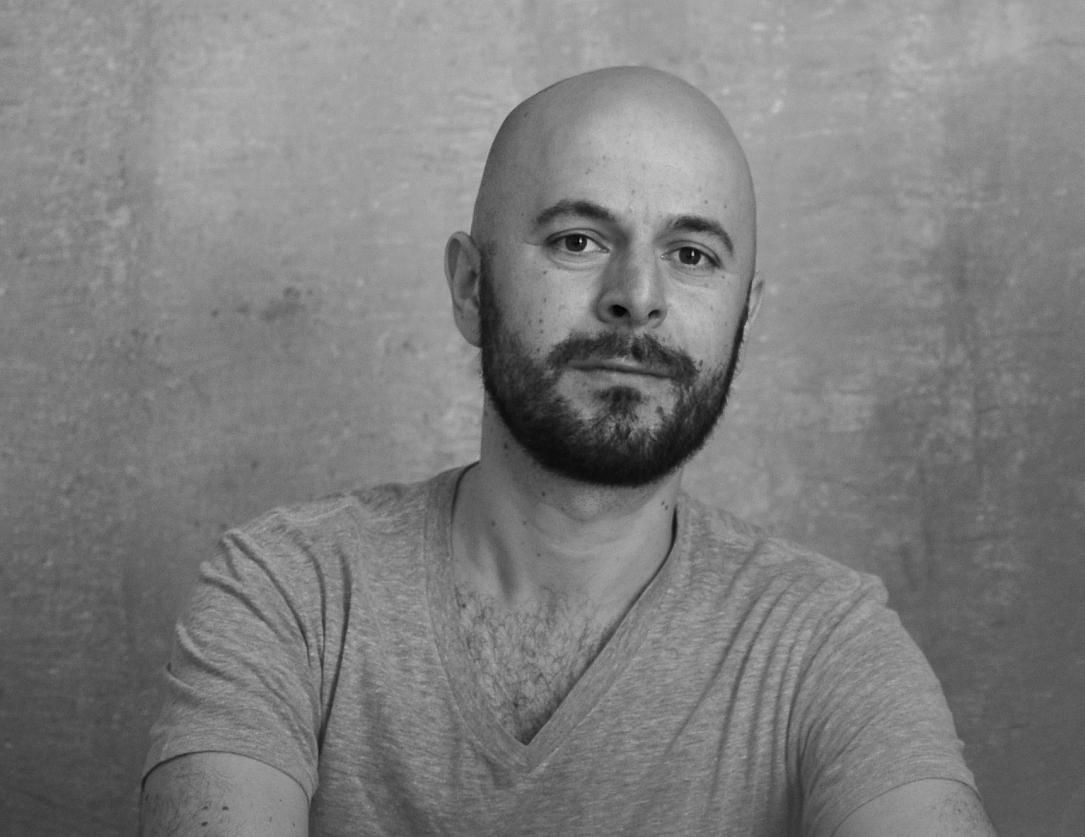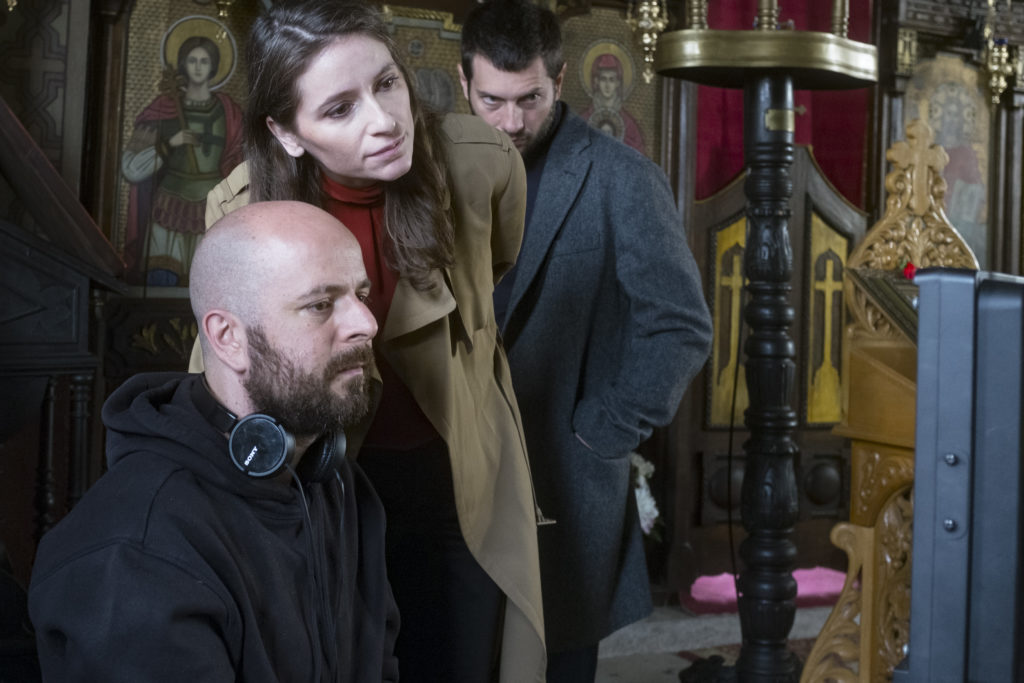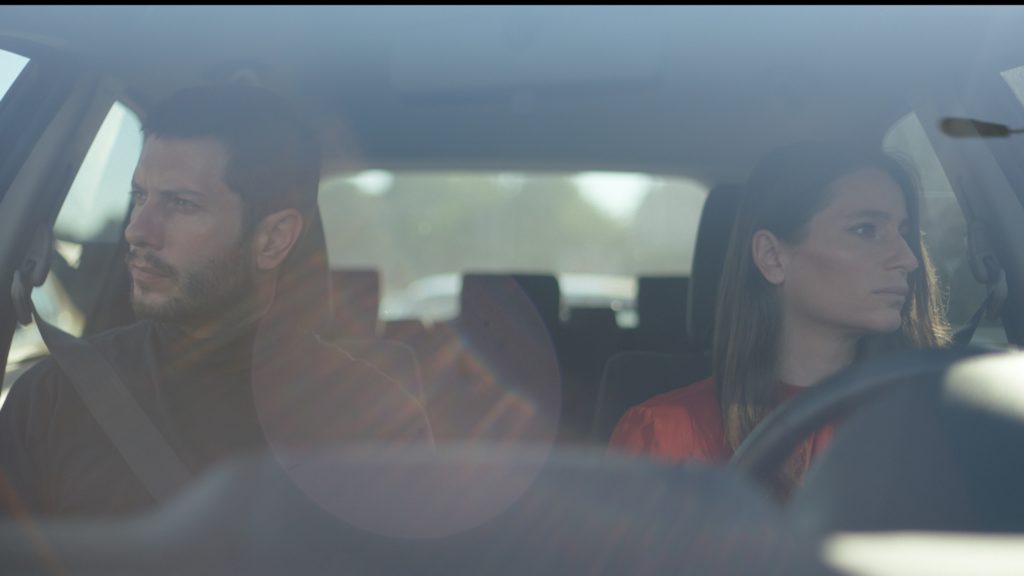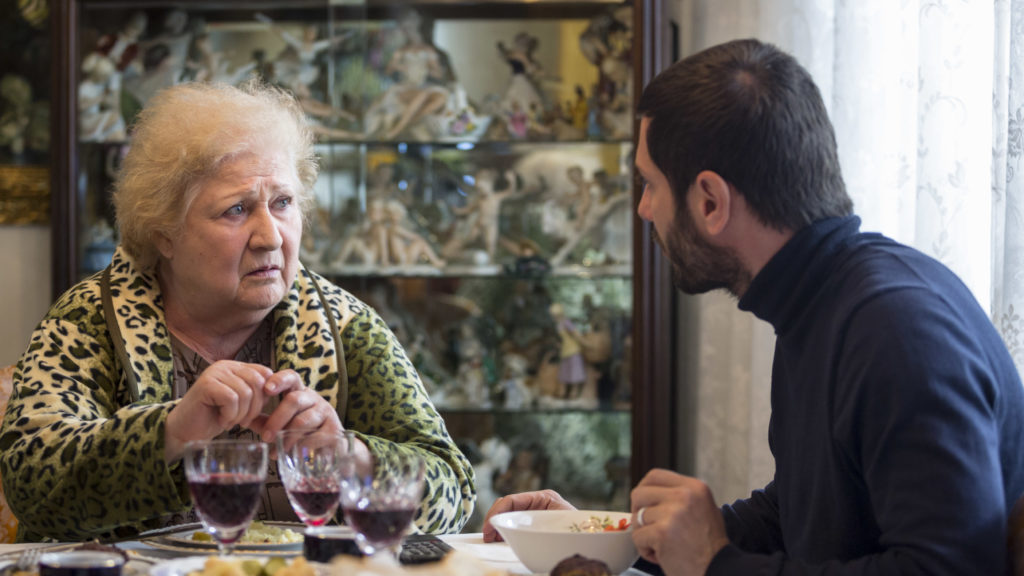Romanian director on his Berlinale film, cast changes and dealing with preconceptions



Monsters. is a love story that has “a certain lightness.” The film had its starting point in the director’s short film Tie. The script, written by Olteanu, is based on a series of interviews with long-time couples “about what one is willing to do for love, about what you do when love is gone, about compromise.”
Conceived as a three-part story, it let viewers in on the relationship of Dana (Judith State) and Arthur (Cristian Popa), who have been married for almost ten years. The film sets about to test the viewers in many ways, as it “explores the clash between social values and the individual choice via bisexuality, the rejection of motherhood, and challenges traditional concepts of love.” The film was fully shot in Bucharest throughout 27 days, on a budget almost half funded by the Romanian Film Center (CNC).
The Romanian premiere of the film is expected towards the end of September. The director hopes the film will be shown at Transilvania International Film Festival (TIFF), the festival where the film was selected for the co-production workshop Transylvania Pitch Stop in 2016. Last year, the film also participated as a work in progress at Karlovy Vary Eastern Promises and at Les Films de Cannes a Bucarest.
Read below the full interview with Marius Olteanu.
Was the film conceived as a feature from the beginning?
I had the situation, the story presented in Monsters. and I developed it as a background for what is seen in the short film. There were very many secondary stories that are not seen in the short but which were used as a background for the characters, for the rehearsals, in the preparation phase; I discussed these things with the director of photography [e.n. Luchian Ciobanu], with the production designer [e.n. Alexandra Alma Ungureanu Stroe]. Then I realized that the story had become so rich that we could transform it into a feature film. So, yes, the intention was there from the beginning.
The script is based on a series of interviews with real couples. Can you tell us more?
In the case of some of the couples I only spoke to one partner. But yes, there were several interviews because, beyond my personal experience and that of my friends, I needed more feedback on this idea of what happens to a couple after eight, ten years together. After a longer period, how does the relationship evolve exactly and how does the idea of compromise arise? I met with people, the moment I noticed something interesting I met again with them and asked more questions. Everything I found interesting I integrated into to the ideas for the script.
The characters, Dana and Arthur, are not one person I met in the flesh and transposed into the script; they are a sum of the things I found out during the interviews and part of these characters is my imagination, and what I wanted to say with this film. After ten years, there is a certain awareness of the giving up one needs to do in order to remain in a couple. This film is, in the end, about a meeting and how far one is willing to go to meet the other.

Monsters. in the making: director Marius Olteanu, Judith State and Cristian Popa. Photo by Adi Marineci
Did you write the script with certain actors in mind?
Yes, when I wrote the script I obviously thought of Ioana Flora, the lead actress from Tie. For the character of Arthur I had thought about Sorin Leoveanu and I wrote the character taking into account who I thought could play it. But at the casting level, the film changed a lot, and my first option wasn’t kept for almost any of the roles. The only two exceptions are Șerban Pavlu and Alexandru Potocean.
With each rehearsal, with every talk on this subject, for some of the parts, I came to the conclusion that my first option was not the right one. At this level it was a very lively process, I did not get stuck in any of the options. I didn’t say: because this is what I chose to do I will not change anything and I will stick to this person no matter what and so on.
First of all, I was interested in keeping the process alive and intense for me as well. I allowed myself to discover things, and when the things I discovered were opposed to my initial intentions I did not ignore it. I took them into account, introduced them into the script and into the whole work process.

Cristian Popa (Arthur) and Judith State (Dana). Photo by Luchian Ciobanu
Does the poster of the film provide a key to its understanding?
The biblical reference is intentional, and it is intentional because in the Bible as well it is about two people whose love does not depend completely on them, and it is not a choice, or it is not completely a choice. There is also the idea of vulnerability, of the care for the other, the need for the other, which I think is present in both the reference and the poster. And probably also the idea of the others sanctioning things they cannot grasp or identify, of sanctioning what is different from yourself. Luchian Ciobanu and I did the photography. He was in charge of the lighting, I did the mise en scène, the concept. Cosmin Tănase did the layout.
What was the most difficult part of making the film?
Two things were difficult. The process itself was simple but what I found most difficult was finding the right actors and working with them, because the characters are quite complicated. They are not characters that can be understood instantaneously, to empathize with instantaneously, and this was one process, one direction.
The other complicated thing was meeting with the preconceived ideas of the people around. Part of them from among the people I needed to get the film done. And I had the surprise to discover, in the case of some people, that the idea of acceptance and tolerance it is much more foreign than they allowed themselves to think it was. People thought of themselves as being much more tolerant and accepting of many more things than they did or do. It is a film that also speaks about family in a non-traditional way, a family that does not check everything tradition requires.
And the film aims to make people understand that family does not always exist in its dictionary version but this does not make it wrong or less valuable. And I am not talking about families where the adults are mom and grandmother.
What fits into the [Forum] program “is defined by the filmmakers’ stance towards their medium rather than the question of what commercial potential a film may have,” according to a Berlinale website description. What’s your stance towards your medium? Why do you make films?
I make films because I like telling stories with images and I like to imagine those stories. To a certain extent, I also like to challenge people to think and it is easier to do this with images than with something else. And in reference to what is written there, I think the film tries at a visual level to propose some things that are different from what we are used to seeing at the cinema, to challenge also aesthetically the viewer to understand their own limits in seeing, to become aware of them. Visually, a part of the film is shot in a square 1:1 aspect ratio. The film plays a lot with the contrast between frames. It uses a lot of extremes, very narrow and very wide frames. And I think this makes it very alert visually.
Anything else we should know about the film?
This film is at times very entertaining. And you wouldn’t think that because you hear about a potential relationship ending. But there are moments in the film, amid all the absurd and these complicated interactions between people, that I would say not only I find amusing but, judging from the reaction of the people who have seen it so far, they are rather on the cheerful, comical side.
The film is a love story and a story that at times has certain humor, a certain lightness, and I don’t think these things should be underestimated. The weight of the subject and a certain depth are things at which the film arrives slowly. Whereas this lightness and the comic part, of characters you can empathize with, is something precise, which can be found in almost every part of the film. Maybe not the comical, because it is not a comedy, but there are many moments when the film is also entertaining.
Sometimes things are so absurd that we arrive at the comical and the entertaining. Things themselves are not very cheerful but there is a comic of the absurd, of the giving up, of compromise, of a reality that at times seems very wrong.

A Monsters. scene featuring actress Dorina Lazăr and actor Cristian Popa. Photo by Adi Marineci
What are you left with from taking part in festivals? The film was shown as a work in progress at several.
I think the interactions with other filmmakers are good, it is good to always check on your ideas, contrast them with the others’, to see where you are visually, where you are with your preoccupations, to receive a feedback on your film projects and, yes, in general, I believe it is good to live not very disconnected from reality. I might have the impression before going to a festival that what I want to do is relevant and it means a lot and then realize that maybe some of those things were done before, were said before, that the way I try to present things is not understood or it does not communicate as I intended it.
From this perspective the presence at festivals is very useful. Given that very many films are being made, that there are so many places where people can see films and series and so on, it is important that people know about your project. To know that there is a film being made on this subject in Romania. It helps a lot. Probably, as it happens with other areas, people like surprises less and when they are ready, when they expect a certain project, a certain film, they receive it more easily afterwards; they are more willing to look at it carefully, to understand it, and why not, like it.
What are you working on now?
I already started writing another script, which I want to be able to turn into a film easier than it happened with Monsters.. And I hope Monsters. will go so well that it will be a bit easier to make this film although, on the other hand, I try to kid myself somehow, it is never easy to make films. It goes into the direction of a horror film.
Do you have some favorite themes in scripts?
Yes, I am very interested in understanding people, and this is also why I make films, to understand why they do what they do. I am very interested in the interaction between people and what hides most of the time in this interaction, what is not immediately accessible. And I think this is visible in Monsters. It is a film that reveals itself slowly. I would like people to see this film, be left with the characters and understand them fully.
Would you like to make films abroad?
I studied at the National School of Television and Film in the UK, I have a Master of Arts in Film Direction, and I worked there. I made a film after I finished school there - Why Don’t you Dance. I made it in 2008. It is a film I care deeply about. I would like to make films with other actors, meaning with actors that I have seen in other films and I like very much. For instance, I think anyone would like to make a film with Charlotte Rampling or with Michelle Williams. And I say this because Certain Women was an inspiration for me, at a discourse level, for Monsters. and Michelle Williams has one of the main parts in that film. So, yes, at the level of the actors it is very tempting to work abroad and make films with other actors than Romanian actors.
On the other hand, I think that at the language level, at the background level, I make at this point films that find a better spot in Romania, at the pre-production and production level. I feel that I am not at the stage of making films abroad and this is dependent on many things. One of the characters in the film says at one point that she likes this country and another asks to explain why. And she says ‘because, look, I am talking to you and I understand all the subtleties of the language.’ I think that, at this point, when it comes to subtleties, to nuances, Romania is a better place for me than another country would be.
What was the first film you made?
Probably the first film I did or that I can think of is a film I did at [e.n. The National University of Theater and Film "I.L.Caragiale" Bucharest] UNATC, in my freshman year. I think there were two stages for me as a director. One stage was when I entered school and I was discovering things, trying things and I tried a lot of things. I did many films, in many areas, many genres. Then, there was another long period of experiments, between 2000 and 2007. In 2007 I did a short called Sunday Afternoon, which was also shot in UK. With it, something changed and I think starting from there all of my films have something in common, and something that represents me.
There is a common thread in all these films and beginning with that film I started having the courage of stating the things I am interested in. The film is about three friends going to a house by the seashore and one of them just found out that he has an incurable disease and he contemplates committing suicide. And the film looks at the last two days from the interaction of these three friends. It is a film I care deeply about. If I were to name the first film where I felt like a director, I felt that what I was doing was directing, not trying, not exploration, this is it.
Another film about an ending
Well, with Monsters. the ending is debatable. Somehow Monsters. is a puzzle, where the pieces can be put together by the viewer so as draw his own conclusion on whether the film is about an ending or not. In the case of Sunday Afternoon, things were more explicit. And at a formal level, it was a bit simpler than Monsters..
Any other projects on the photography side?
There is a project I’m doing with Luchian Ciobanu about people at the age of 40. It is an installation, each photography will have its own interview, where the people will speak about what midlife means, about what life looks like at 40. It is a project that I hope to finish this year. There will be portraits of people more or less close to me or who had an insight into this age. Ideally, it would be ready by September, to be able to launch it around the launch of the film.
Marius Olteanu Bio
Born in Bucharest in 1979, he studied Film Directing at the National University of Theater and Film “I.L. Caragiale” in Romania from 2000 -2004. In 2008 he got a M.A. in Film Directing from the National Film and Television School, United Kingdom. Through his short films as a writer-director, he has chosen to focus on the clash between private and social life and the boundaries that arise. His last two shorts, Tie (2015), which was the starting point for his feature debut Monsters., and No Man’s Land (2017) were selected in more than 30 festivals, among them Busan IFF, Tallinn POFF, Namur FIFF, TIFF. He also worked as an assistant director for the film Sieranevada by Cristi Puiu and is a published photographer. Filmography: Monsters.(2019), feature film; No Man’s Land (2017), short film; Tie (2015), short film; Why don’t you dance? (2008), short film; Sunday Afternoon (2007), short film.
(Opening photo by Adi Marineci)
Interview by Simona Fodor, simona@romania-insider.com